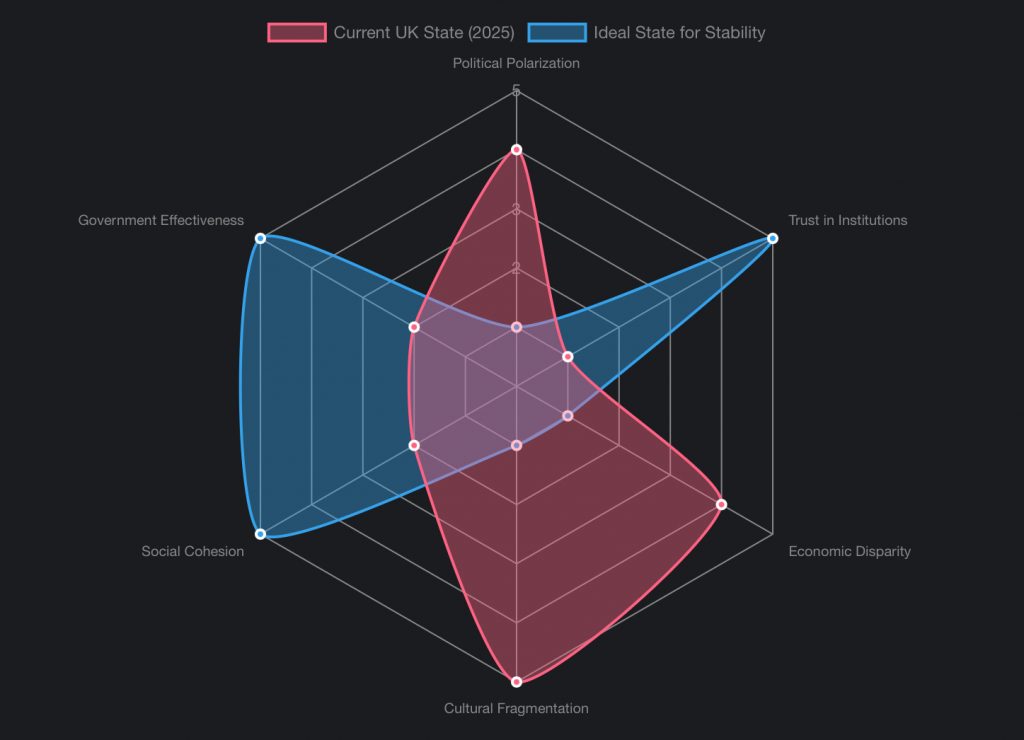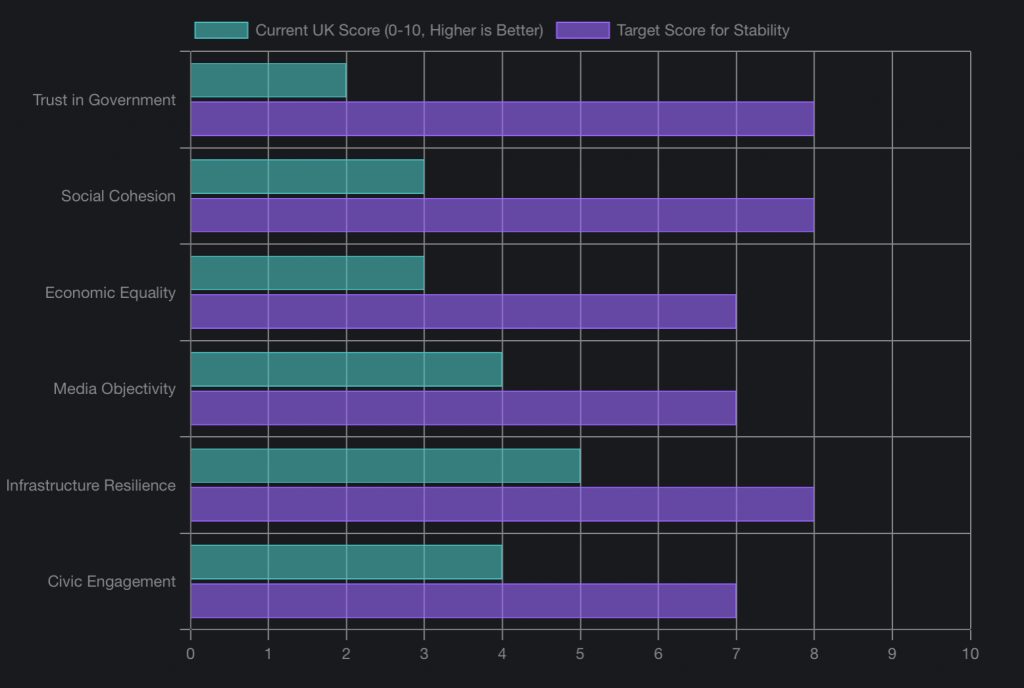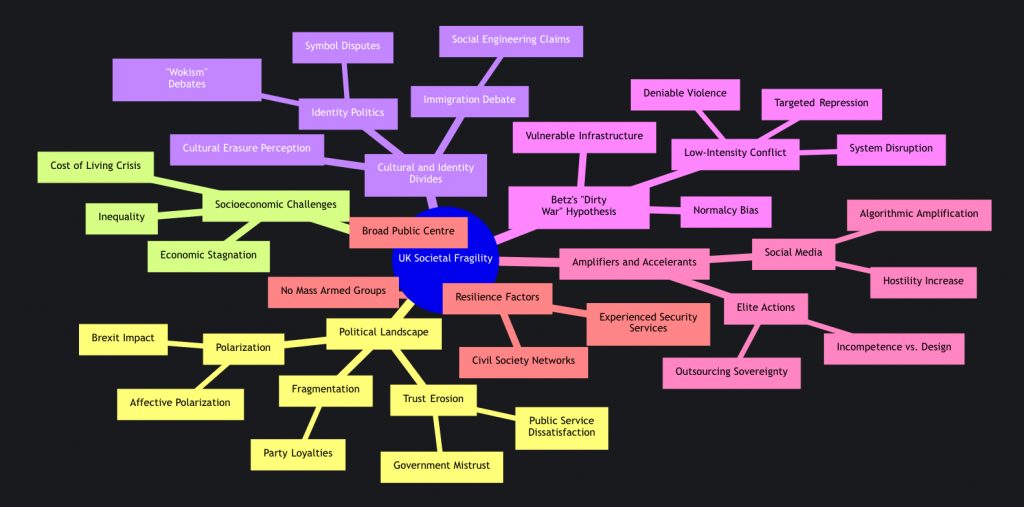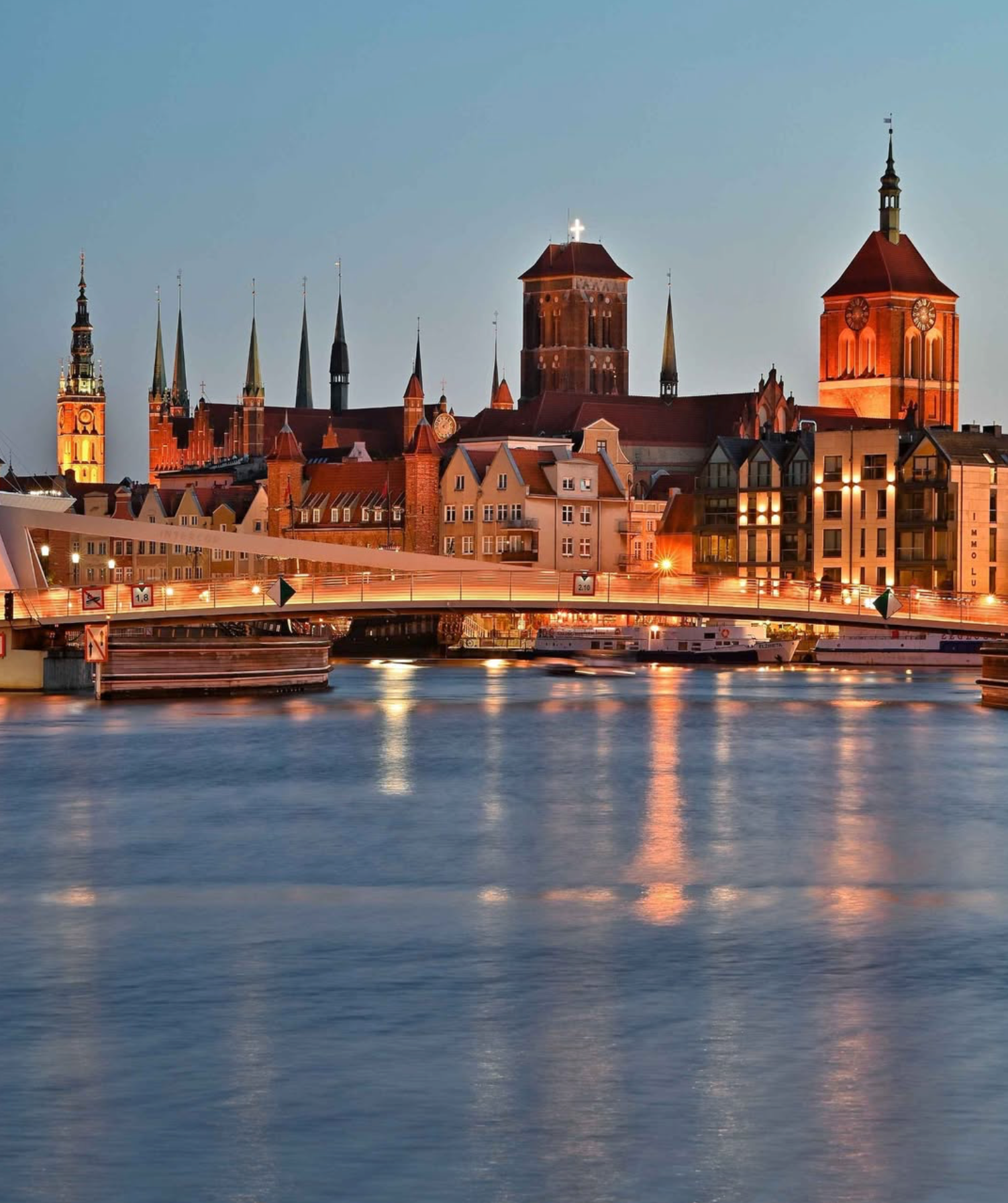Examining expert warnings, societal fractures, and potential pathways for conflict or resilience in the UK.
72+ Sources
- Understanding Professor David Betz’s “Dirty War” Thesis
- Underlying Conditions Fueling Internal Strife
- Incompetence or Contrivance? The Debate Over Causality
- A Snapshot of UK Societal Dynamics
- Counterarguments and Nuances: Is Civil War Inevitable?
- Pathways to Mitigation and Rebuilding Trust
- Mapping the Roots of Societal Fragility
- The Pervasive Impact of Polarization: A Video Insight
- Frequently Asked Questions (FAQ)
- Conclusion: A Call for Vigilance and Action
- Recommended Further Exploration
- Referenced Search Results
- Escalating Polarization: The UK is experiencing significant political and social polarization, particularly in the aftermath of Brexit, coupled with declining trust in governmental institutions.
- The “Dirty War” Scenario: Experts, notably Professor David Betz, warn of a potential “dirty war” – a low-intensity conflict characterized by repression, targeted actions, and deniable violence rather than traditional warfare.
- Resilience and Mitigation: Despite these serious warnings, full-scale civil war is not considered inevitable, with strong counterarguments highlighting the UK’s social resilience, absence of mass armed organizations, and potential for proactive trust-building measures.
The notion of Britain drifting towards internal conflict, once a fringe idea, has entered mainstream discourse, propelled by analyses from scholars like Professor David Betz of King’s College London. His warnings are not merely sensational but are grounded in an examination of deepening societal divisions, eroding institutional trust, and a fragmented social fabric. This comprehensive response will delve into Professor Betz’s theories, explore the prevailing conditions in the UK that lend credence to these concerns, and critically assess counterarguments and pathways to resilience.
Understanding Professor David Betz’s “Dirty War” Thesis
Professor David Betz, a respected scholar of War in the Modern World at King’s College London, has put forth a stark warning regarding the potential for civil conflict in Western nations, particularly the UK, within the coming years. His core argument centers on the concept of a “dirty war” rather than a traditional civil war involving uniformed armies and territorial conquest. This distinction is crucial for understanding the nature of the predicted conflict.
Defining the “Dirty War”
According to Betz, a “dirty war” is characterized by:
- Low-intensity conflict: It would involve sporadic, deniable violence rather than large-scale battles.
- Repression in the shadows: This includes targeted arrests, selective justice, surveillance, and information warfare.
- System disruption: Attacks on vulnerable urban infrastructure and critical systems could be a hallmark.
- Politicized policing: Law enforcement might be perceived as acting with political bias, further eroding trust.
- Information operations: The spread of misinformation and propaganda to control narratives and sow dissent would be prevalent.
Betz draws parallels with historical instances such as Northern Ireland’s Troubles in the late 20th century or conflicts in Latin America during the 1970s, where internal strife manifested as clandestine operations and state-sanctioned repression. He suggests that while life on the surface might appear normal, the nation would be corroding beneath through a series of subtle yet impactful actions.
The “Normalcy Bias” and the Path to Conflict
A significant aspect of Betz’s argument is what he terms “normalcy bias” among the British populace. He contends that Britons inherently perceive themselves as peaceful, making it difficult for them to acknowledge the potential for internal conflict. This bias, he argues, leads to a collective sleepwalking into a “dirty war,” where the signs of escalating internal threats are overlooked or downplayed. The conditions, he warns, are already in place, making the UK particularly susceptible to this trajectory within years, not decades.
Underlying Conditions Fueling Internal Strife
The conditions described by Professor Betz are echoed by various analyses of the contemporary UK landscape. Several interconnected factors contribute to the deepening divisions and erosion of societal cohesion.
Political Polarization and Fragmentation
The UK has witnessed a significant increase in political polarization, particularly in the wake of the 2016 Brexit referendum. This has led to a fragmentation of political support and an rise in “affective polarization,” where individuals develop strong negative feelings towards opposing political groups. While some sources suggest current divisions might not be as severe as those in the 1980s, the intensity of identity-driven politics is undeniable. The Conservative Party’s stance against “wokism,” for example, is cited as a contributing factor to this polarization.

Protests and demonstrations highlight growing social tensions within the UK.
Declining Trust in Institutions
A critical factor identified by Betz and supported by data is the significant decline in trust and confidence in the government and public institutions. Reports, such as the British Social Attitudes survey, indicate that satisfaction with key public services like the NHS is near historic lows. This erosion of trust is seen as a major threat to the social contract, potentially leading to groups retreating into mutual suspicion and undermining the legitimacy of governance.
Economic Pressures and Social Divides
Persistent economic stagnation, coupled with existing social inequalities, exacerbates the fragility of the social fabric. Issues such as economic insecurity, perceived “downgrading” or displacement of segments of the population, and the impact of immigration policies are seen as contributing to these rifts. These factors can drive support for radical political parties and contribute to a sense of disenfranchisement among various groups.
The Role of Identity Politics and Cultural Friction
The user’s query highlights how flags and symbols have become markers of identity and division. The perceived marginalization of national symbols like the Cross of St George, while other cultural or political symbols are celebrated, is presented as a provocation. This intense focus on identity politics, whether framed through immigration, cultural erasure, or “woke” ideologies, creates deep fault lines that can harden into mutually dehumanizing camps, even in the absence of extreme ideological differences.
Incompetence or Contrivance? The Debate Over Causality
The discussion around Britain’s trajectory often includes a debate about whether the current crisis is a result of elite incompetence or deliberate design. While the user’s query leans towards “contrivance,” asserting that patterns suggest a deliberate strategy of “divide and rule,” it’s crucial to examine both perspectives.
Arguments for Elite Incompetence
Many analyses attribute the UK’s challenges to a series of policy missteps and a failure of governance to adequately address societal needs. This perspective suggests that successive governments have struggled with complex issues like economic management, public service reform, and social integration, leading to unintended consequences such as declining trust and increased polarization. From this viewpoint, the crisis is a cumulative result of genuine difficulties and a lack of effective solutions.
Arguments for Deliberate Contrivance
Conversely, the “contrivance” argument, as presented in the user’s query, posits that certain policies have been intentionally implemented to foster division. Examples cited include:
- Immigration as “social engineering”: The claim that Tony Blair’s government deliberately used immigration to “rub the Right’s nose in diversity” suggests a strategic intent to alter the social fabric.
- Outsourcing sovereignty: The argument that successive governments have ceded authority to international bodies, thereby stripping the British electorate of power, implies a weakening of democratic accountability.
- “New managerial class” and identity politics: The idea that figures like “diversity officers” or “decolonisers” are part of a mission to “fracture the majority, elevate favoured minorities, and govern by conflict” suggests a top-down strategy of social restructuring.
While publicly available research describes policy choices as politically consequential, direct evidence of a coordinated project to engineer civil war is not a settled finding. These are often contested political interpretations rather than universally accepted conclusions.
A Snapshot of UK Societal Dynamics
To better understand the complex interplay of factors discussed, here’s an opinionated assessment of various aspects contributing to or mitigating internal strife in the UK.

This radar chart illustrates a qualitative assessment of the UK’s current societal health against an ideal state for stability. It highlights areas of particular concern, such as high cultural fragmentation and low trust in institutions, juxtaposed with the desired conditions for a more cohesive society.
Counterarguments and Nuances: Is Civil War Inevitable?
While Professor Betz’s warnings are serious and well-researched, it is crucial to consider counterarguments and nuances that suggest full-scale civil war is not an inevitable outcome.
Definition of Civil War vs. Civil Unrest
Many critics of the “civil war” prediction argue that what Betz describes might be more accurately termed civil unrest or strife. A traditional civil war typically involves organized armed conflict, significant territorial changes, and a direct rebellion against the government. While the UK is experiencing heightened tensions and potential for disorder, it currently lacks the mass armed organization or territorial enclaves that are benchmarks for a full-scale civil war.
UK vs. US Polarization
Despite increased polarization, the UK is generally considered less divided than the United States. Studies suggest that while fragmentation exists, particularly post-Brexit, Britons exhibit less stubborn partisanship compared to the US, and class divides might be overstated, with cross-economic friendships potentially moderating attitudes.
Resilience Factors
Britain possesses inherent resilience factors that could mitigate the risk of widespread conflict:
- Absence of Mass Armed Organization: There is no widespread, organized armed opposition group capable of challenging the state in a conventional sense.
- Experienced Security Services: The UK’s security services have extensive experience in counter-terrorism and managing internal threats, which could be vital in containing low-intensity conflict.
- Broad Public Centre: A significant portion of the public still occupies a broad political and social centre, which can act as a stabilizing force.
- Civil Society Networks: Robust civil society networks exist that can bridge divides and foster dialogue, even amidst polarization.
Comparing Vulnerabilities and Resilience
The following table summarizes the key vulnerabilities that increase the risk of internal strife in the UK, alongside the resilience factors that may prevent a full-blown civil war.
| Vulnerability Factors | Resilience Factors |
|---|---|
| Low trust in institutions and government. | Absence of mass armed organization or territorial enclaves. |
| High affective polarization and identity-first politics. | Security services with deep experience in counter-terrorism. |
| Urban fragility and critical infrastructure dependency. | A still-broad political and social centre in public opinion. |
| Information ecosystems amplifying grievance and conspiracism. | Robust civil society networks capable of bridging divides. |
| Economic stagnation and deepening social inequalities. | Strong democratic traditions and legal frameworks. |
Pathways to Mitigation and Rebuilding Trust
Given the serious nature of the warnings, proactive measures are essential to mitigate the risks and rebuild societal cohesion. The emphasis should be on preventative actions rather than fatalism.
Rebuilding Institutional Trust
This is paramount. It involves demonstrating tangible improvements in public services, ensuring transparent governance, and fostering independent oversight. Restoring confidence in the fairness and effectiveness of institutions can significantly reduce the sense of alienation and perceived illegitimacy.
De-escalating Affective Polarization
Efforts should focus on promoting cross-cutting civic engagement, such as citizens’ assemblies and deliberative forums. These platforms can encourage dialogue across different identities and reduce out-group animosity. Additionally, promoting media literacy and designing social media platforms that reduce the amplification of divisive content can help cool down the “culture wars.”
Strengthening Critical Infrastructure
Addressing urban fragility by enhancing the resilience of critical infrastructure (power, telecoms, transport) is vital. This includes conducting tabletop exercises for “system disruption” scenarios and developing rapid-repair capabilities to minimize the impact of potential attacks or sabotage.
Ensuring Depoliticized Policing and Justice
Maintaining consistent and impartial law enforcement is crucial. This means protecting lawful speech and assembly while rigorously enforcing against intimidation and violence, regardless of political affiliation. Public standards and audits can help prevent perceptions of selective justice, which contribute to declining trust.
Addressing Foreign Sub-Threshold Activity
The National Security Strategy 2025 acknowledges the risk of foreign actors exploiting internal fractures. Strengthening attribution capabilities, legal deterrence, and civic inoculation against information operations are vital to counter external attempts to destabilize the UK.

This bar chart provides a comparative view of the UK’s current performance in critical areas against target scores for achieving greater stability. It highlights the significant gaps that need to be addressed to avert potential internal strife, emphasizing the need for robust efforts in building trust, cohesion, and resilience.
Mapping the Roots of Societal Fragility
The mindmap below visualizes the interconnected factors contributing to Britain’s perceived societal fragility, as discussed by Professor Betz and other analysts. It illustrates how various elements, from political dynamics to cultural shifts, converge to create an environment where internal conflict becomes a plausible concern.
mindmap
root((UK Societal Fragility))
Political_Landscape[“Political Landscape”]
Polarization[“Polarization”]
Brexit_Impact[“Brexit Impact”]
Affective_Polarization[“Affective Polarization”]
Trust_Erosion[“Trust Erosion”]
Government_Mistrust[“Government Mistrust”]
Public_Service_Dissatisfaction[“Public Service Dissatisfaction”]
Fragmentation[“Fragmentation”]
Party_Loyalties[“Party Loyalties”]
Socioeconomic_Challenges[“Socioeconomic Challenges”]
Economic_Stagnation[“Economic Stagnation”]
Inequality[“Inequality”]
Cost_of_Living[“Cost of Living Crisis”]
Cultural_and_Identity_Divides[“Cultural and Identity Divides”]
Identity_Politics[“Identity Politics”]
“Wokism_Debates”[“#quot;Wokism#quot; Debates”]
Symbol_Disputes[“Symbol Disputes”]
Immigration_Debate[“Immigration Debate”]
Social_Engineering_Claims[“Social Engineering Claims”]
Cultural_Erasure_Perception[“Cultural Erasure Perception”]
Betz_Hypothesis[“Betz’s #quot;Dirty War#quot; Hypothesis”]
Low_Intensity_Conflict[“Low-Intensity Conflict”]
Targeted_Repression[“Targeted Repression”]
Deniable_Violence[“Deniable Violence”]
System_Disruption[“System Disruption”]
Normalcy_Bias[“Normalcy Bias”]
Vulnerable_Infrastructure[“Vulnerable Infrastructure”]
Amplifiers_and_Accelerants[“Amplifiers and Accelerants”]
Social_Media[“Social Media”]
Algorithmic_Amplification[“Algorithmic Amplification”]
Hostility_Increase[“Hostility Increase”]
Elite_Actions[“Elite Actions”]
Incompetence_vs_Design[“Incompetence vs. Design”]
Outsourcing_Sovereignty[“Outsourcing Sovereignty”]
Resilience_Factors[“Resilience Factors”]
No_Mass_Armed_Groups[“No Mass Armed Groups”]
Experienced_Security_Services[“Experienced Security Services”]
Broad_Public_Centre[“Broad Public Centre”]
Civil_Society_Networks[“Civil Society Networks”]

This mindmap visually connects the various elements contributing to the discussion around potential internal conflict in the UK. It groups related concepts, illustrating the complex interplay between political, socioeconomic, and cultural factors, and highlights Professor Betz’s central arguments within this context.
The Pervasive Impact of Polarization: A Video Insight
The increasing political polarization in the UK is a central theme in the discussions surrounding potential civil strife. This phenomenon is extensively explored in the video below, which delves into how polarization is holding Britain back. Understanding its dynamics is crucial for grasping the broader context of societal fragmentation.
“Alex Phillips: Political polarisation is holding Britain back” from GB News discusses the pervasive impact of increasing political divides in the UK, a key factor in the ongoing debate about internal stability.
This video provides further insight into how political polarization, characterized by rigid ideological lines and a breakdown of consensus, actively impedes progress and exacerbates societal tensions. It underscores the urgency of addressing these divisions to foster a more functional and cohesive political environment, directly linking to the concerns raised by Professor Betz about the hollowing out of democracy and increased social friction.
Frequently Asked Questions (FAQ)
What does Professor David Betz mean by a “dirty war”?
Professor David Betz describes a “dirty war” as a low-intensity internal conflict, distinct from traditional warfare. It would involve repression in the shadows, targeted arrests, selective justice, surveillance, and deniable violence, rather than large-scale battles or territorial changes. The goal is often system disruption and control through subtle means.
What are the main factors contributing to the UK’s current divisions?
Key factors include heightened political polarization (especially post-Brexit), declining public trust in government and institutions, significant economic disparities, and deepening cultural and identity-based divisions. Social media and debates over immigration and national symbols further amplify these fault lines.
Is civil war in Britain considered inevitable by experts?
While experts like Professor Betz warn of a strong likelihood of internal conflict, the consensus is that a full-scale civil war is not inevitable. The UK possesses significant resilience factors, such as the absence of organized armed groups, experienced security services, and a broad societal center, which mitigate the risk of widespread, conventional conflict.
What is “affective polarization”?
Affective polarization refers to the phenomenon where individuals develop strong negative feelings, dislike, or even hatred towards members of opposing political or social groups, often seeing them as fundamentally different or morally flawed. This goes beyond simple policy disagreements to deep-seated emotional animosity.
What steps can be taken to reduce the risk of internal conflict?
Mitigation strategies include rebuilding trust in institutions through transparent governance and improved public services, de-escalating affective polarization through civic engagement and media literacy, strengthening critical infrastructure resilience, ensuring depoliticized policing, and actively countering foreign efforts to exploit internal divisions.
Conclusion: A Call for Vigilance and Action
The warnings from Professor David Betz and other experts regarding Britain’s trajectory towards internal conflict, characterized as a “dirty war,” are serious and warrant careful consideration. The underlying conditions—deepening political polarization, eroding institutional trust, persistent economic inequalities, and exacerbated cultural divisions—create a fertile ground for societal instability. While the concept of a full-scale civil war with conventional battles may not align with the current reality, the prospect of a low-intensity, repressive conflict in the shadows is a stark and plausible scenario.
However, it is equally important to recognize that this outcome is not predetermined. Britain retains significant resilience, including the absence of mass armed organizations, highly capable security services, and a substantial portion of the populace that values peace and stability. The debate surrounding whether the current crisis is a result of incompetence or deliberate design highlights the complex nature of the challenges facing the nation.
Ultimately, Betz’s work serves as a critical stress-test for the UK’s assumptions about its inherent stability. It is a powerful call to action, urging both policymakers and ordinary citizens to move beyond “normalcy bias” and actively address the root causes of division. Rebuilding trust, fostering genuine dialogue, and strengthening the social fabric through inclusive policies and resilient infrastructure are paramount. The choice remains: to passively observe the nation’s potential dissolution or to proactively reclaim and reinforce its foundations, ensuring that the “lions of Britain” awaken not to roar at each other, but to collectively forge a more cohesive and stable future.
Recommended Further Exploration
- [How is political polarization measured in the UK?](/?query=How is political polarization measured in the UK?)
- [What is the history of civil unrest in the UK?](/?query=What is the history of civil unrest in the UK?)
- [Impact of social media on political discourse in Britain](/?query=Impact of social media on political discourse in Britain)
- [Strategies for national cohesion and trust-building in diverse societies](/?query=Strategies for national cohesion and trust-building in diverse societies)
Referenced Search Results
bi.team
calenda.org
Polarisation of British and American societies – Calenda
kcl.ac.uk
Divided Britain? | The Policy Institute – King’s College London
natcen.ac.uk
British Social Attitudes 41 | Five years of unprecedented challenges…. – NatCen Social Research
thenewconservative.co.uk
Is Britain on the Road to Civil War? – The New Conservative
militarystrategymagazine.com
Civil War Comes to the West, Part II: Strategic Realities – Military Strategy Magazine
mirror.co.uk
Military expert gives chilling British ‘civil war’ warning over ‘feral cities’ – The Mirror
louiseperry.co.uk
The Coming British Civil War – David Betz | Maiden Mother Matriarch Episode 124 – Louise Perry
unherd.com
Is civil war coming for Britain? – UnHerd
expose-news.com
Experts predict a civil war in the UK; there is no political solution – The Expose
club.unherd.com
podcasts.apple.com
The Coming British Civil War – David Betz | Maiden Mother Matriarch …
pesd.princeton.edu
Post-Conflict Economic Reconstruction | The Princeton Encyclopedia of Self-Determination
history.com
Camp David Accords signed | September 17, 1978 | HISTORY
ajc.org
Timeline: Key Events in the Israel-Arab and Israeli-Palestinian Conflict | AJC
ndtv.com
guiltandindustry.medium.com
Opinion: Is the UK Headed for Civil War? | Medium
vaia.com
Social Class in the United Kingdom: History | Vaia
sites.udel.edu
Social Life in Victorian England | British Literature Wiki
electionanalysis.uk
Stoking the culture wars: the risks of a more hostile form of polarised …
researchfeatures.com
Changing patterns of social mobility in Britain
reddit.com
link.springer.com
Political polarization in the UK: measures and socioeconomic …
ukcolumn.org
Integrity Initiative | UKColumn
tacticalnotebook.substack.com
Civil War in Britain? – by Bruce Ivar Gudmundsson
militarystrategymagazine.com
Civil War Comes to the West – Military Strategy Magazine
natcen.ac.uk
BSA 42 | Politics and social media
thefocalpoints.com
Government Advisor Warns UK Is Heading For Civil War
vads.ac.uk
Designing Britain – Social Reform 1930-1950
americanfaith.com
David Betz Warns of Civil War Risk in the West Rising – American Faith
newstatesman.com
Why the American right loathes modern Britain
theguardian.com
Rightwingers warn of another blaze of summer riots in Britain
ebsco.com
Camp David Accords | EBSCO Research Starters
humanevents.com
Austrian court upholds Sharia ruling in civil contract case | Human Events | humanevents.com
businesstoday.in
sciencedirect.com
Working class economic insecurity and voting for radical right and …
uk-values.org
Polarisation and partisanship: 10 key takeaways from our World …
newstatesman.com
Visions of an English civil war
scholarsarchive.byu.edu
[PDF] The United Kingdom and Brexit: A Case Study in Affective Polarization
en.wikipedia.org
Social class in the United Kingdom – Wikipedia
policy.bristoluniversitypress.co.uk
Policy Press | Social Divisions – Inequality and Diversity in …
churchtimes.co.uk
Viewpoint with Andrew Brown: Is civil war coming to UK?
gov.uk
National Security Strategy 2025: Security for the British …
linkedin.com
Civil war is coming to the UK but not in the way you think
bps.org.uk
Political polarisation: Are you part of the problem? | BPS
europeanconservative.com
Is Civil War Coming to Europe? ━ The European Conservative
programminginsider.com
How to Choose the Best Civil Litigation Lawyers in Abbotsford – Programming Insider
unherd.com
Is civil war coming for Britain? – UnHerd
economist.com
New data show that the class divide in Britain may not be so wide
nytimes.com
Opinion | Is Civil War Coming to Europe? – The New York Times
zerohedge.com
Britain’s Descent Towards Civil War Is No Accident | ZeroHedge
lightforthelastdays.co.uk
Signs of the Times – March 2025 – Light for the Last Days
intellinews.com
Analysts expect ‘perfect storm’ of political risks in 2025
cbn.com
‘Slide Into Chaos’: Is Great Britain About to Explode in Civil War? | CBN News
uk.linkedin.com
Dr David Betz – War Studies, King’s College London
spectator.com.au
The coming British civil war, with David Betz | The Spectator Australia
nickbuckleymbe.substack.com
A New English Civil War Has Started – Violence Is Coming
telegraph.co.uk
Britain is on the brink of civil war, says Steve Bannon
reddit.com
eu-startups.com
era.org.au
UK model and the risk of civilisation’s collapse by 2040 – Economic Reform Australia
kcl.ac.uk
Professor David J Betz | King’s College London
britannica.com
United Kingdom – Society, state, and economy | Britannica
assets.publishing.service.gov.uk
theoccidentalobserver.net
David Betz: Civil War Comes to the West, Part II: Strategic Realities – The Occidental Observer
dailysceptic.org
Britain’s Descent Towards Civil War is No Accident – The Daily Sceptic
telegraph.co.uk
Britain is lurching towards civil war, and nobody knows …
sharesmagazine.co.uk
The big story of 2025 isn’t the one you thought it was
thepropheticyears.com
Break Up of the United States of America and Civil Upheavals
reddit.com
theguardian.com
US voters are increasingly polarised over politics, but Brits are far …
mdpi.com
The Future of War Is Civil War – MDPI
Last updated September 5, 2025



